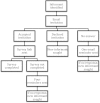No global consensus: a cross-sectional survey of maternal weight policies
- PMID: 24884985
- PMCID: PMC4031379
- DOI: 10.1186/1471-2393-14-167
No global consensus: a cross-sectional survey of maternal weight policies
Abstract
Background: Growing evidence suggests that maternal prepregnancy weight and gestational weight gain are risk factors for perinatal complications and subsequent maternal and child health. Postpartum weight retention is also associated with adverse birth outcomes and maternal obesity. Clinical guidelines addressing healthy weight before, during, and after pregnancy have been introduced in some countries, but at present a systematic accounting for these policies has not been conducted. The objective of the present study was to conduct a cross-national comparison of maternal weight guidelines.
Methods: This cross sectional survey administered a questionnaire online to key informants with expertise on the subject of maternal weight to assess the presence and content of preconceptional, pregnancy and postpartum maternal weight guidelines, their rationale and availability. We searched 195 countries, identified potential informants in 80 and received surveys representing 66 countries. We estimated the proportion of countries with guidelines by region, income, and formal or informal policy, and described and compared guideline content, including a rubric to assess presence or absence of 4 guidelines: encourage healthy preconceptional weight, antenatal weighing, encourage appropriate gestational gain, and encourage attainment of healthy postpartum weight.
Results: Fifty-three countries reported either a formal or informal policy regarding maternal weight. The majority of these policies included guidelines to assess maternal weight at the first prenatal visit (90%), to monitor gestational weight gain during pregnancy (81%), and to provide recommendations to women about healthy gestational weight gain (62%). Guidelines related to preconceptional (42%) and postpartum (13%) weight were less common. Only 8% of countries reported policies that included all 4 fundamental guidelines. Guideline content and rationale varied considerably between countries, and respondents perceived that within their country, policies were not widely known.
Conclusions: These results suggest that maternal weight is a concern throughout the world. However, we found a lack of international consensus on the content of guidelines. Further research is needed to understand which recommendations or interventions work best with respect to maternal weight in different country settings, and how pregnancy weight policies impact clinical practices and health outcomes for the mother and child.
Similar articles
-
The effect of weight management interventions that include a diet component on weight-related outcomes in pregnant and postpartum women: a systematic review protocol.JBI Database System Rev Implement Rep. 2015 Jan;13(1):88-98. doi: 10.11124/jbisrir-2015-1812. JBI Database System Rev Implement Rep. 2015. PMID: 26447010
-
Preconception and interconception health status of women who recently gave birth to a live-born infant--Pregnancy Risk Assessment Monitoring System (PRAMS), United States, 26 reporting areas, 2004.MMWR Surveill Summ. 2007 Dec 14;56(10):1-35. MMWR Surveill Summ. 2007. PMID: 18075488
-
Changing national guidelines is not enough: the impact of 1990 IOM recommendations on gestational weight gain among US women.Int J Obes (Lond). 2016 Oct;40(10):1529-1534. doi: 10.1038/ijo.2016.97. Epub 2016 May 20. Int J Obes (Lond). 2016. PMID: 27200502 Free PMC article.
-
A review of national health policies and professional guidelines on maternal obesity and weight gain in pregnancy.Clin Obes. 2014 Aug;4(4):197-208. doi: 10.1111/cob.12062. Epub 2014 Jun 23. Clin Obes. 2014. PMID: 25826791 Review.
-
Obesity Before, During, and After Pregnancy: A Review and Comparison of Five National Guidelines.Am J Perinatol. 2016 Apr;33(5):433-41. doi: 10.1055/s-0035-1567856. Epub 2015 Nov 20. Am J Perinatol. 2016. PMID: 26588260 Review.
Cited by
-
Associations of Gestational Weight Gain with Perinatal Outcomes in Western Brazilian Amazon.Matern Child Health J. 2022 Oct;26(10):2030-2039. doi: 10.1007/s10995-022-03480-9. Epub 2022 Jul 31. Matern Child Health J. 2022. PMID: 35908240
-
Regular weighing to prevent excessive gestational weight gain: a study protocol for a systematic review and meta-analysis.Syst Rev. 2022 May 26;11(1):104. doi: 10.1186/s13643-022-01977-6. Syst Rev. 2022. PMID: 35619165 Free PMC article.
-
Guidelines on how to monitor gestational weight gain during antenatal care.Rev Bras Ginecol Obstet. 2023 Feb;45(2):104-108. doi: 10.1055/s-0043-1766109. Epub 2023 Mar 28. Rev Bras Ginecol Obstet. 2023. PMID: 36977408 Free PMC article. No abstract available.
-
Gestational weight gain standards based on women enrolled in the Fetal Growth Longitudinal Study of the INTERGROWTH-21st Project: a prospective longitudinal cohort study.BMJ. 2016 Feb 29;352:i555. doi: 10.1136/bmj.i555. BMJ. 2016. PMID: 26926301 Free PMC article.
-
Healthcare Professional Training Regarding Gestational Weight Gain: Recommendations and Future Directions.Curr Obes Rep. 2021 Jun;10(2):116-124. doi: 10.1007/s13679-021-00429-x. Epub 2021 Feb 20. Curr Obes Rep. 2021. PMID: 33609271 Free PMC article. Review.
References
Publication types
MeSH terms
LinkOut - more resources
Full Text Sources
Other Literature Sources
Medical


